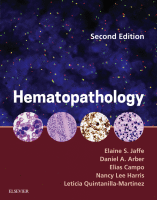Physical Address
304 North Cardinal St.
Dorchester Center, MA 02124

The spectrum of lymphomas encountered in extranodal sites differ from those encountered in lymph nodes ( Tables 61-1 and 61-2 ). Many of the lymphomas that involve extranodal sites are described as specific pathologic entities in other chapters. This chapter…

Few hematologic malignancies arise primarily in the spleen; most conditions occurring at this site represent secondary involvement by diseases originating elsewhere in the body. The role of the pathologist in most cases is to confirm the known or suspected diagnosis…

Non-lymphoid elements are frequently present in surgically excised lymph nodes. This chapter reviews the most commonly encountered tumors and non-neoplastic lesions, especially those that can mimic lymphoma, and provides an update on studies useful in distinguishing them. The chapter begins…

Definition The bone marrow, the primary site of hematopoiesis, may contain hematopoietic or non-hematopoietic tumors and also frequently reflects metabolic disturbances. The occurrence of bone marrow metastases is strongly influenced by microenvironmental factors that favor the engraftment of certain malignancies.…

General Approach A great number of changes occur in the bone marrow during and after therapy for malignancy. Although proper interpretation of these changes requires knowledge of the patient's original disease process, some general features are common to all cases.…

Bone marrow examination is an important part of the workup of patients with lymphoma. It is often performed for staging purposes as well as for follow-up to evaluate for response to therapy or recurrence. In some patients, a diagnosis of…

Definition Lymphoproliferative disorders (LPDs) associated with iatrogenic immunodeficiency constitute a spectrum of lymphoid or plasmacytic proliferations, including a major subset that occurs after solid organ, stem cell, or bone marrow transplantation (post-transplant lymphoproliferative disorders [PTLDs]). A smaller number of cases…

Human primary immunodeficiencies (PIDs) are inborn errors of the immune system and comprise over 260 different genetic disorders. PIDs often result in predisposition to infection and tend to present early in life, with high morbidity and high mortality if left…

The Histiocytes This chapter reviews aspects of Langerhans cell histiocytosis as a prototypical representative of the condition, and this is followed by consideration of the histiocytic and dendritic cell sarcomas and disseminated juvenile xanthogranuloma. Advances in these conditions since the…

The histiocytoses are a group of disorders characterized by the proliferation of macrophages and dendritic cells. The contemporary classification of histiocytic disorders (a classification proposed by the Reclassification Working Group of the Histiocyte Society and the World Health Organization Committee…